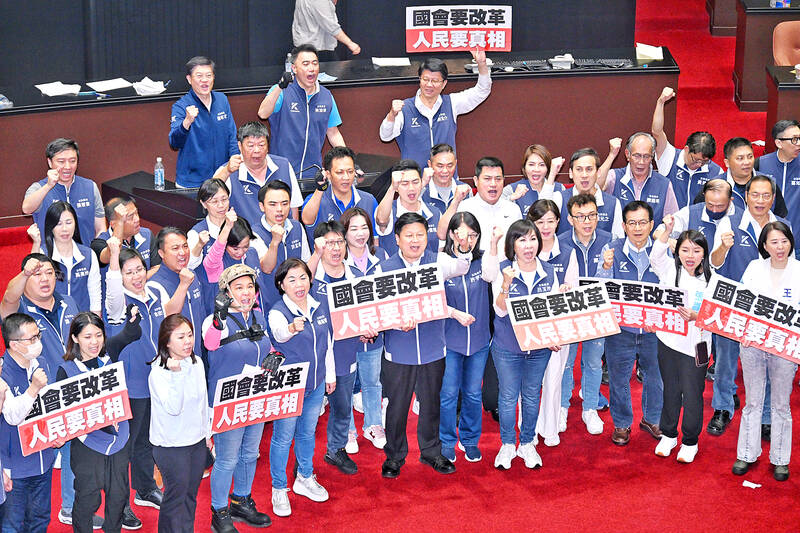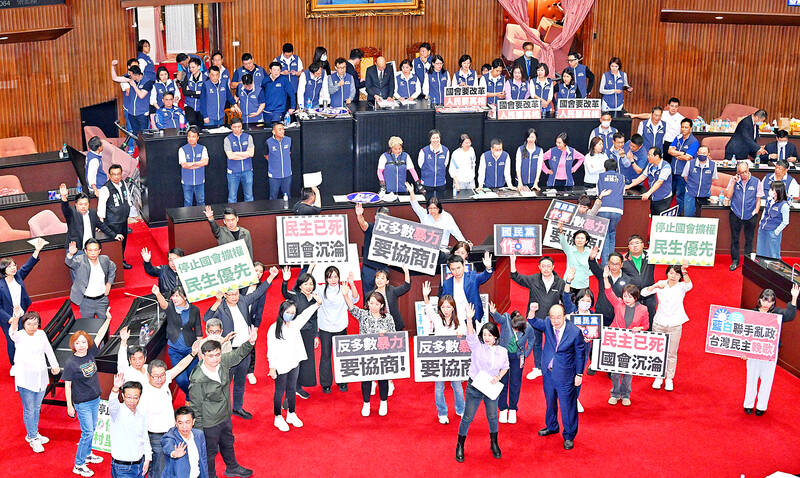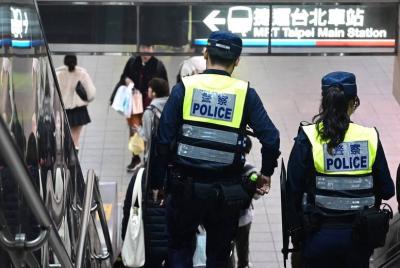After a day of scuffles and disputes, the Legislative Yuan on Friday completed the second reading of amendments that would require the president to make an annual state of the nation address in front of lawmakers and answer questions.
Voting on the amendments to Article 15 of the Act Governing the Legislative Yuan’s Power (立法院職權行使法) proposed by the Chinese Nationalist Party (KMT) and the Taiwan People’s Party (TPP) were held close to midnight after long breaks due to intermittent scuffles and procedural stalling tactics by the Democratic Progressive Party (DPP).
At 12am on Saturday Legislative Speaker Han Kuo-yu (韓國瑜) announced the end of Friday’s legislative floor session, which had started at 9am, and said the proceedings would resume on Tuesday.

Photo: Fang Pin-chao, Taipei Times
Article 15 stipulates that the president can opt to deliver an annual state of the nation address at the Legislative Yuan, although no president has ever done so. The amendment would make the address mandatory.
The amendments would also allow the president to be questioned about the address by lawmakers on the spot, as other Cabinet officials are, rather than having them raise questions that the president can respond to at a later date if they choose, as the law currently provides for.
It is expected that a third and final reading on the two amendments, and a vote on other bills would take place on Tuesday.

Photo: Fang Pin-chao, Taipei Times
A vote on several bills, including legislative reform amendments, had been scheduled for Friday.
However, the bills sparked disputes not only because of their content, but because of the manner in which they were brought to the second reading vote.
The DPP said that they were rushed through the Judiciary and Organic Laws and Statutes Committee and sent to the legislative floor for their second and third readings without any deliberation in committee meetings.
Bills sent to the floor without being hashed out in committee meetings, especially those that would have major consequences, would usually be subject to a delay before a second reading to allow cross-caucus negotiations.
DPP caucus secretary-general Rosalia Wu (吳思瑤) yesterday accused the opposition parties of setting “a terrible precedent” of allowing bills to be voted on the legislative floor without such a process.
KMT caucus secretary-general Hung Meng-kai (洪孟楷) said that the legislative reform bills went through the committee, cross-caucus negotiations and public hearing processes.
Wu also said the votes during Friday’s session were done by shows of hands without recording the names of voters, "which is extremely rare on the legislative floor."
TPP caucus whip Huang Kuo-chang (黃國昌) yesterday said that legislative procedures allow Han to hold votes by a show of hands and the DPP is free to seek to change the rules.
Han had no choice but to resort to a show of hands because lawmakers from the KMT and the TPP had encircled the podium to defend the speaker and could not use the electronic voting devices at their seats, Huang said.
The DPP’s attempt to physically remove the speaker from the podium was designed to prevent voting by forcing the opposition to choose between keeping the podium and their voting devices, when they needed both, he said.
The DPP’s accusation that it was not allowed to review the bills was groundless, as its lawmakers filed about 80 near-identical versions to delay the vote, he added.
The KMT has 52 seats in the 113-seat legislature, while the DPP has 51, the TPP eight and two are independents ideologically aligned with the KMT.
Additional reporting by Lee Wen-hsin

Beijing could eventually see a full amphibious invasion of Taiwan as the only "prudent" way to bring about unification, the US Department of Defense said in a newly released annual report to Congress. The Pentagon's "Annual Report to Congress: Military and Security Developments Involving the People's Republic of China 2025," was in many ways similar to last year’s report but reorganized the analysis of the options China has to take over Taiwan. Generally, according to the report, Chinese leaders view the People's Liberation Army's (PLA) capabilities for a Taiwan campaign as improving, but they remain uncertain about its readiness to successfully seize

Taiwan is getting a day off on Christmas for the first time in 25 years. The change comes after opposition parties passed a law earlier this year to add or restore five public holidays, including Constitution Day, which falls on today, Dec. 25. The day marks the 1947 adoption of the constitution of the Republic of China, as the government in Taipei is formally known. Back then the Chinese Nationalist Party (KMT) governed China from Nanjing. When the KMT, now an opposition party in Taiwan, passed the legislation on holidays, it said that they would help “commemorate the history of national development.” That

Taiwan has overtaken South Korea this year in per capita income for the first time in 23 years, IMF data showed. Per capita income is a nation’s GDP divided by the total population, used to compare average wealth levels across countries. Taiwan also beat Japan this year on per capita income, after surpassing it for the first time last year, US magazine Newsweek reported yesterday. Across Asia, Taiwan ranked fourth for per capita income at US$37,827 this year due to sustained economic growth, the report said. In the top three spots were Singapore, Macau and Hong Kong, it said. South

Police today said they are stepping up patrols throughout the Taipei MRT system, after a social media user threatened to detonate a bomb at an unspecified station this afternoon. Although they strongly believe the threat to be unsubstantiated, Taipei Metro police and the Railway Police Bureau still said that security and patrols would be heightened through the system. Many copycat messages have been posted since Friday’s stabbing attacks at Taipei Main Station and near Zhongshan MRT Station that left three dead and 11 injured, police said. Last night, a Threads user in a post said they would detonate a bomb on the Taipei